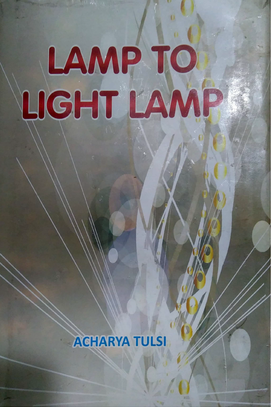One of the formulas of anuvrat is—self-restraint alone is life. I often wonder if this is theoretical or practical. If it is regarded only as theoretical and accepted only as a doctrine, then it would not be possible to put it to practical use in life. The scriptures are all replete with doctrines. A man needs them, understands their meanings and explains them to others. But doctrines are not meant just for that. Their practical aspects should also come before us and they should be tried in practice. In an age of science it is difficult to have public support for anything unless its validity is established in the laboratory. From that point of view, even religious and moral principles are expected to be presented in practical terms. The basis of experiment at the individual level becomes the personal wealth of the individual.
King Janaka asked the great sage Yajnavalkya-
"Oh great sage, I wish to see. How can I do it?" The sage said, "There is sunlight and there is moonlight. There are also the stars, planets and constellations. Find your path in their light." King Janaka said, "Oh great sage, if it is the dark moonless night (amavasya) and a person is seated in the basement of a house, how he would be able to see? The light of the sun, the moon, the planets, the constellations and the stars would not reach the basement." Yajnavalkya said, "There one can be guided by the sound. Proceed in the direction from where the sound comes." The next question was, "What if there is no sound either?" Yajnavalkya answered "Where no light is available room outside, see with your own inner light— with the light of your soul." Everyone possesses light of the soul. But who uses it?”
There is a famous song of Kabir—"The fish is thirsty in water." The fish lives in water, but writhes with thirst. Not only Kabir, anyone can laugh to hear that. But what is the point of laughing? This is the strange thing about life. So long as man does not have self-knowledge, he continues to wander in Mathura and Kashi. The deer keeps wandering in the jungle. Why? It runs in all directions, attracted by the fragrance of the musk. Its frantic running is the result of its ignorance. It does not know that the musk lies right in its own navel.
There are thousands of sages and saints in the world. They are engaged in meditation day and night. They recite the name of God. With meditation and sadhana through recitation, if they keep on searching for God outside, where would they realise God? No matter how many years pass in this quest, the goal cannot be achieved because the imperishable Supreme Being resides right in the individual himself.
Man aspires for happiness. But where is happiness? One can definitely feel apparently happy by enjoying material comforts. But the real happiness does not lie there. Happiness lies in abnegation, in self-restraint. The current of self-restraint is flowing right before man. But still he is unhappy, because regarding restraint as of lesser importance; he takes recourse to unrestrained life. Even though he knows.that unrestrained means unhappiness, he still ignores that reality. An elephant caught in the swamp sees the dry land in front, but it is still unable to reach, there. It tries to rise from the swamp but is unable to do so. How can the wish to reach the dry land materialise without rising from the Swamp?
The elephant is an animal. It possesses no knowledge, no discretion. That is why it suffers hardship. But man is equipped with knowledge. His sense of discretion and consciousness are alive. He knows which way lies happiness and which way lies unhappiness. In spite of knowing this, he goes along the path of unhappiness. Instead of observing in practice, he praises self-restraint only as a matter of principle. In such a situation, the experience of Kabir – ‘Fish is thirsty in water’ seems to be a testified hundred per cent.
 Acharya Tulsi
Acharya Tulsi
